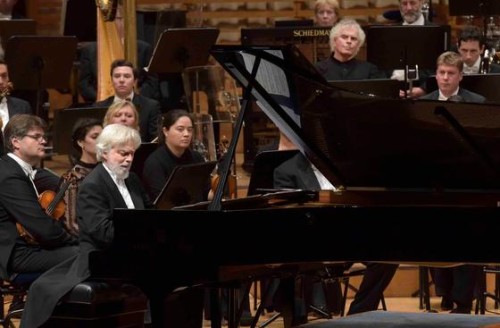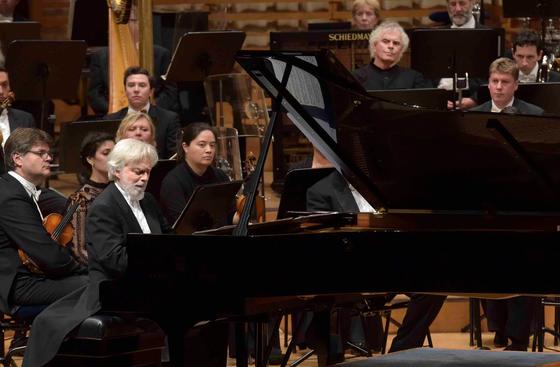
 Switzerland Lucerne Festival [4] – Bernstein, Dvořák, Janáček: Krystian Zimerman (piano), London Symphony Orchestra / Sir Simon Rattle (conductor), Kultur- und Kongresszentrum Lucerne (KKL) 11.9.2018. (JR)
Switzerland Lucerne Festival [4] – Bernstein, Dvořák, Janáček: Krystian Zimerman (piano), London Symphony Orchestra / Sir Simon Rattle (conductor), Kultur- und Kongresszentrum Lucerne (KKL) 11.9.2018. (JR)

(c) Lucerne Festival/Peter Fischli
Bernstein – Symphony No.2, Age of Anxiety
Dvořák – Slavonic Dances Op.72
Janáček – Sinfonietta
My fellow reviewer Gregor Tassie has already reviewed the identical programme performed by the LSO under Sir Simon Rattle at the Edinburgh Festival (click here) and was as perplexed as I by Rattle’s odd choices.
Rattle wanted to honour the centenary of Bernstein’s birth, and has a clear admiration for his second symphony. The symphony is based on a poem by W.H. Auden, of which the full title is ‘The Age of Anxiety: a baroque eclogue’ (I had to look up the word ‘eclogue’ which was new to me: it is Middle English, meaning ‘a pastoral poem, often in dialogue form’). The symphony, almost a piano concerto, is probably also inspired by the well-known painting by Edward Hopper entitled ‘The Nighthawks’ depicting a group of individuals gathering in a New York Bar, after World War II. In the Auden poem, these characters (three men, one woman) discuss their problems, spend the night in the woman’s flat, and some of them discover faith in the morning. The music has an understandable air of melancholy for long sections and consequently is by no means easy listening. There is some admirable orchestral writing, especially for the clarinets. Rattle wrenched as much emotion as he could from his string section. Surprisingly, the piece has never been performed at the Lucerne Festival and therefore would have been new to many, although there was a performance in Zurich not long ago. The work ends with a lengthy jazzy section in which the pianist has some fun on the keyboard accompanied by a large percussion section. The ending is not bleak; quite the opposite, the almost blazing finale has Mahler at its roots. Before that there are clear echoes of Prokofiev.
Zimerman was one of Bernstein’s pianists of choice for this work, which he clearly holds in some reverence. His technique was never in doubt. After a warm reception, Zimerman – normally a man of few words – gave a fairly impromptu speech; apparently he is prone to such digressions. (Ten years ago he stunned the Los Angeles audience with a tirade of denunciation for US plans to install a missile defence shield in his native homeland, Poland). Zimerman’s speech at this KKL concert was in praise of Bernstein, not only the musician but for his courageous political stance. The speech was hardly audible to most in the hall, but I did hear the word ‘Vietnam’. Obviously the Festival management was not expecting a speech and had not laid on a microphone.
After the interval the mood lightened; we were treated to Czech music, clearly dear to Rattle’s heart (he happens to be married to Czech mezzo, Magdalena Kožená). Dvořák’s second set of Slavonic Dances is more introspective, less ebullient than the first, with a number of wistful dances. The fast and furious dances are often played as encores, so it was good to hear the set as a whole. I would have liked some Eastern European rusticity in the orchestral sound – just listen to the Czech Philharmonic under Karel Ančerl, Václav Talich or Jiří Bělohlávek in the same music. The LSO performance was rather like driving a Range Rover on a country track: too genteel. The orchestra did, of course, play magnificently, to virtual perfection, and the audience lapped it up. I must mention Andrew Marriner’s splendid clarinet contributions; he is still a wonder at close to retiring age, having now been principal clarinet with the LSO for over 30 years.
The real meat of the evening was provided by Janáček’s outstanding masterpiece Sinfonietta. Rattle had his row of nine trumpeters (augmented by the orchestra’s own three trumpeters who remained seated) stand at the back of the orchestra for maximum visual and aural effect. They duly blasted us out of our seats with their brass fanfares that open and close this mini-symphony. The squawking trombones were equally impressive, as was – towards at the end of the work – the fabulous E flat clarinet-playing of Chi-Yu Mo.
The audience was left in no doubt that this partnership of the LSO and Simon Rattle has much to offer audiences in future.
John Rhodes
